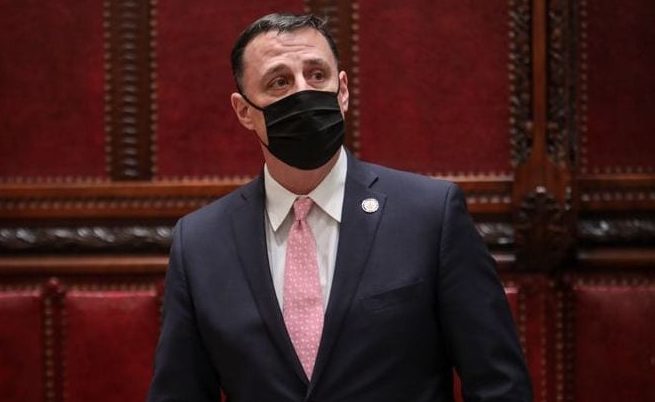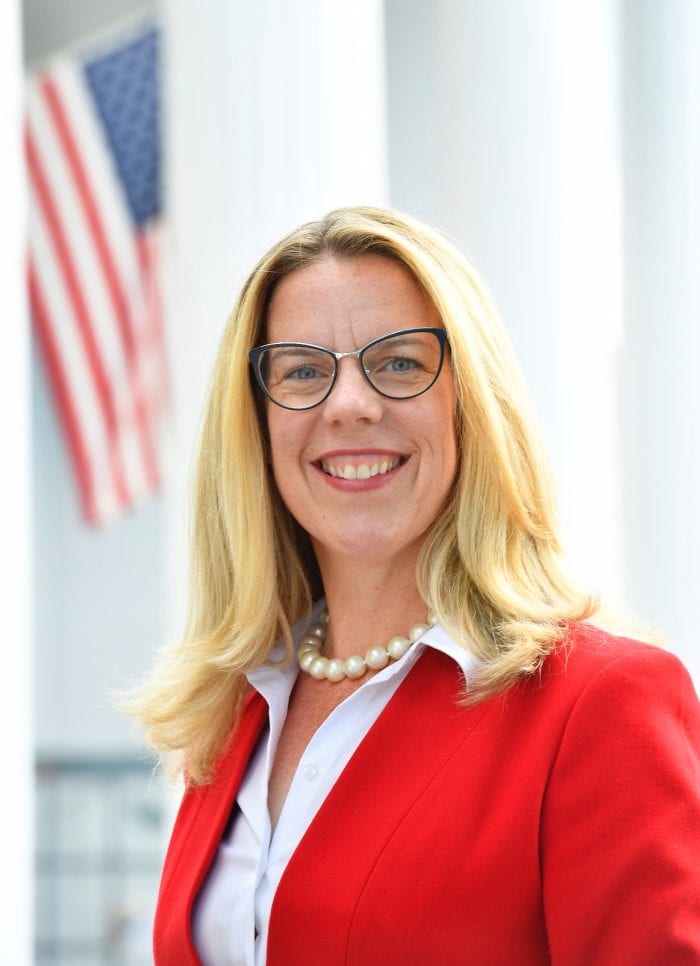State Sen. Anthony Palumbo (R-New Suffolk) has been in his new role for a little over a month now, and has made it clear that before anything gets done on his laundry list of things to do, COVID-19 recovery is the first battle.
When the former state assemblyman and legislator announced he would be running for former state Sen. Ken LaValle’s (R-Port Jefferson) seat, he had some big shoes to fill.
“This is not necessarily my first rodeo,” Palumbo said, adding that his new role is nearly two-and-a-half sizes larger than his previous district.
Palumbo’s former Assembly 2nd District — now led by Assemblywoman Jodi Giglio (R-Riverhead) — runs across the North Shore from Fishers Island all the way to Mount Sinai. He was first elected in 2013 with a 57% vote. His new District 1 spans across the whole East End, beginning near Port Jefferson all the way out to Montauk.
And since he took office in January, he’s been busy, he said. This past week, he helped secure about 650 vaccines at Peconic Landing in Greenport — one of the hardest hit nursing homes on Long Island at the beginning of the COVID-19 pandemic. Palumbo said that in less than three hours, 300 residents were given their first shot in hopes to combat the virus.
“The immediate goal is COVID,” he said. “It’s getting us back to business and safely opening back up.”
Palumbo said in order to get there, the biggest solution is obtaining and distributing vaccines, which New York State has been ridiculed for.
“Micromanaging the distribution of the vaccines has been a disaster,” he said. “And unfortunately, this is how it began. The governor [Andrew Cuomo (D)] had strict guidelines, and that was really the hiccup.”
Palumbo said he has been “highly critical of the government” especially after being able to distribute the vaccines to the seniors in Greenport, with the help of Stony Brook University Hospital.
“A prime example is what [we did at Peconic Landing],” he said. “Then, the hospital said they can quadruple their vaccines if they have the opportunity.”
And Palumbo wants to look to ask the federal government for help.
“We have the capability to do this,” he said. “Unfortunately, we were slower than most states because of the executive orders control in the government. It needs to loosen up more.”
The vaccine wins at Peconic Landing last week brought him back to reality, he said.
“This affects people’s lives,” he said, “And as elected officials, this is what we’re supposed to be doing — facilitating.”
Passionate about rolling out the vaccine to everyone who wants it, Palumbo said it has been frustrating.
“We knew the vaccine was coming for months,” he said. “We had time to prepare.”
He criticized Cuomo’s plan. Palumbo said that since other states, like Florida, have been open, they are doing OK in terms of COVID-positive numbers and deaths.
“What are we doing?” he said. “We really need to get back to work.”
Palumbo added that not only was the distribution an issue in terms of acquiring vaccines, but obtaining them has been a nightmare for his constituents, too.
“We don’t have a website that works when we knew early on people were going to frantically go to it,” he said.
And once the vaccine rollout is complete, Palumbo said things can go back to ways they were.
“Big-box stores haven’t been closed for a day throughout the pandemic,” he said. “But [around] 95% of other businesses can’t open.”
He mentioned that one of those industries is hospitality on Long Island.
“Hospitality is the number one revenue for the city and state,” he said. “With them being closed, it’s killing us. We’re losing billions in revenue.”
But while conquering COVID is the primary goal, Palumbo has other plans that he wants to accomplish within his new role as state senator.
“We have a lot of issues that are continuing,” he said. “They’re not on the backburner — they’re a close second.”
Palumbo noted that his district “has more coastline than any other district.” As a member of the Environmental Conservation Committee, he said he knows the importance of clean drinking water and runoff in his district — especially out on the East End — and plans to keep working toward them.
A former prosecutor, he said he will continue monitoring issues within law enforcement throughout his term, and also wants to make sure young people stay on the Island.
“People are fleeing the state in droves,” he said. “And we’re probably going to lose two congressional seats because of it.”









